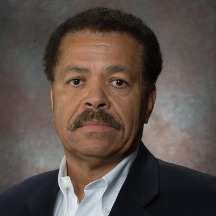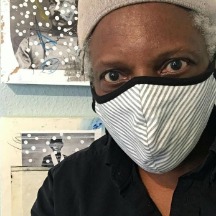Since March, the world has been in a spin and has forced most people to become very creative in planning and carrying out their normal activities. Some amazing stories have been emerging on how planners at Mosaic Theater in DC, the Afro-American Historical and Genealogical Society conference for Hampton, VA, and the San Francisoco-based Global Arts Project (GAP) has been adapting and carrying out their plans during the COVID-19 pandemic.
After a 5-month hiatus from programming, Ari Roth, Artistic Director of the Mosaic, says he is excited that the H Street, NE theater is again making art and providing work to DC artists. “Inherit the Windbag, which was set to open in mid-March, just as the lockdown started in DC, has begun virtual rehearsals for a full-length film adaptation of the play with Paul Morella as Gore Vidal, John Lescault as William F. Buckley, and Tameika Chavis and Stephen Kime as Demons from the 1968 Republican Convention,” he says.
Instead of having rehearsals at the Atlas Theater, were Mosaic makes its home, Roth had “properly sanitized cameras, green screens, microphones, costumes and props” delivered to the actors' homes. Lee Mikeska Gardner will direct from her home in Boston, while Alexandra Petri will continue to work on the script from DC.
In Hampton, Virginia, down the Atlantic seaboard from DC, AAHGS had scheduled the city to be the site for the AAHGS 2020 conference since August 2019. “The conference in Hampton, probably would have been our largest conference ever,” says Ric Murphy, AAHGS Vice President of History. “We opened registration on March 1 and in one week we sold out the conference hotel,” he continued. Then, the realities of the pandemic set in and the conference planners decided to cancel the physical conference because “we didn’t want to be a super spreader.”
After shutting down the physical conference, they had to renegotiate contracts and notify venders. “Six months of work went down the drain,” he said sadly. Conference planners then had to become experts in virtual conference planning. To help us, “we have retained a company to be the virtual platform, Webex.”
Even with help from Webex, the transition was extremely challenging. “We even had some speakers and presenters drop out for various technical reasons,” added Murphy. And, when schools went virtual, they then ran into problems getting technical assistance since many technicians were focused on working with the schools.
After much work, “we have about 600 registrants and 20 of the 60 speakers have been selected as Virginia Scholars,” the genealogical researcher continued. AHHGS and the Virginia Humanities Council selected those 20 for their ground breaking work with tracing their lineage to 1619. “AAHGS has also selected the 20 book awardees and we still have about a month to go; so, things are looking great,” summed up Murphy.
Gone Virtual- How Theater, Genealogy, and Art Meetings Have Changed


Virginia is the birthplace of African American history and the conference aims to correct the national narrative of the African American in American History. During the conference, several speakers will reveal how they traced their ancestors to Kabasa, Angola, the date they left, the ship in which they arrived, and the specific day they arrived in what would become the United States. “And they will share the specific skills they brought to the fledging colonies and how the Angolans were able to save the colonies with the skills they had that the English did not,” added Murphy.
After shutting down the physical conference, they had to renegotiate contracts and notify venders. “Six months of work went down the drain,” AAHGS Vice President of History Ric Murphy said sadly.
Planning for GAP is a bit more complicated since the flagship program of the San Francisco-based organization is its residency series where the artists gather in a city, create art, and hold workshops with the public. They held GAP VII, or the seventh residency program, in Dakar, in 2018.
GAP currently has 60 members representing 17 countries who coalesce via Facebook year-round and
scheduled the Gap VIII residency program for summer 2021 in Minneapolis. The organization has also been working with its new sponsor, the Soo Family Foundation, and the Soo Visual Arts Center. We are growing says organizer Carl Heyward, “It’s our first sponsored residency.”
Then the pandemic struck and remained. “I have been calmly approaching canceling the residency,” says abstract artist Heyward. “The George Floyd killing has had a chilling affect on our planning, but the idea of having participants fly from around the world to Minneapolis during the pandemic is even more concerning.”
However, like Roth of Mosaic and Murphy of AAHGS, Heyward continues to look to the future. GAP continues to have showings by appointments at Gallerie Renee Marie in Benicia, California and at Jennifer Perlmutter Gallery in Lafayette, California, whose space is large enough for them to practice social distancing and have regular hours. However, as far as the artist being able to come physically together in 2021, in Minneapolis, he remains hopeful. “I am still adapting and planning,” he says.
To attend the virtual annual AAHGS conference, register now.
After shutting down the physical conference, they had to renegotiate contracts and notify venders. “Six months of work went down the drain,” AAHGS Vice President of History Ric Murphy said sadly.
Planning for GAP is a bit more complicated since the flagship program of the San Francisco-based organization is its residency series where the artists gather in a city, create art, and hold workshops with the public. They held GAP VII, or the seventh residency program, in Dakar, in 2018.
GAP currently has 60 members representing 17 countries who coalesce via Facebook year-round and
scheduled the Gap VIII residency program for summer 2021 in Minneapolis. The organization has also been working with its new sponsor, the Soo Family Foundation, and the Soo Visual Arts Center. We are growing says organizer Carl Heyward, “It’s our first sponsored residency.”
Then the pandemic struck and remained. “I have been calmly approaching canceling the residency,” says abstract artist Heyward. “The George Floyd killing has had a chilling affect on our planning, but the idea of having participants fly from around the world to Minneapolis during the pandemic is even more concerning.”
However, like Roth of Mosaic and Murphy of AAHGS, Heyward continues to look to the future. GAP continues to have showings by appointments at Gallerie Renee Marie in Benicia, California and at Jennifer Perlmutter Gallery in Lafayette, California, whose space is large enough for them to practice social distancing and have regular hours. However, as far as the artist being able to come physically together in 2021, in Minneapolis, he remains hopeful. “I am still adapting and planning,” he says.
To attend the virtual annual AAHGS conference, register now.
Advertisers | Contact Us | Events | Links | Media Kit | Our Company | Payments Pier
Press Room | Print Cover Stories Archives | Electronic Issues and Talk Radio Archives | Writer's Guidelines






